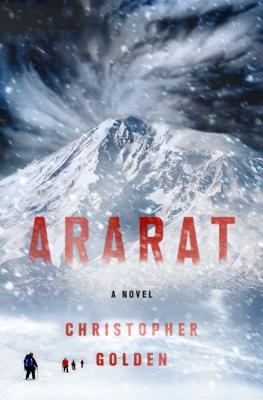Ararat
Christopher Golden
St. Martin’s Press
April 2017
Reviewed by Michael R. Collings
In Ararat, Christopher Golden creates a microcosm of human beings, flawed and frail, facing a situation that demands a strength of mind and emotion that none of them possesses. To heighten the tension, he includes in that microcosm individuals that, in contemporary society, are as often at odds as in agreement: strictly traditionalist men and outspokenly progressive women; by-the-book scientists and more accepting philologist-philosophers; atheists and religionists; and, to make the admixture even more explosive, Christians, Muslims, and Jews.
Eventually, they discover, such differences count little in the face of a blatantly, unapologetically supernatural horror. They must all work together simply to survive because, as one character states late in the novel, “Terror is a great equalizer.”
The story begins apocalyptically, to use the word in its stem meaning: ‘to uncover, to discover.’ A massive avalanche uncovers an enormous cavern some 12,000 feet above sea level. Inside the cavern — or, rather, composing the cavern — are remnants of an ancient ship-like structure, complete with the skeletal remains of animals…and humans.
Almost instantly, the name “Noah’s Ark” is whispered about — reverently by Christian and Jew, less so by Muslim, and with decided mockery by atheists. Meryam Karga and her fiancé Adam Holzer, leaders of the multi-national, multi-cultural expedition, must somehow weld the disparate factions into a single, working team, especially in the face of an oncoming blizzard that threatens to trap them in the cavern.
But the specter of an ancient Biblical story being proven categorically true, with all of the world-wide ramifications such a discovery would entail, pales at the implications of an artifact they discover deep within the ark: a coffin, thickly covered with bitumen; inscribed with letters that, as one character recognizes, pre-dates any of the religions represented; and containing the remains of a monster — twisted, misshapen, and horned. In form, at least, a demon.
And then the killings begin.
In Ararat, Golden does a masterful job balancing multiplying tensions as the expedition realizes that there is a murderer among their number…and that at any moment, any one of them might be possessed by the creature they have released. The blizzard shows no sign of diminishing; and ultimately the survivors are forced to attempt a descent, acknowledging the possibility — soon revealed as horrific fact — that they are bringing the demon with them.
With each permutation of the basic story, characters reveal more and more of themselves and their motivations, their secrets and their fears. They confront death and betrayal, love and dedication, hope and loss. The ark becomes a claustrophobic prison, as much for the expedition members as it had been for those whose remains the scientists must study. And the descent in the blizzard, far from providing an escape, merely functions to trap them further.
In its own way, the novel is particularly timely, both as speculative fiction and as commentary on the differences — often artificial and arbitrary — that divide humanity. Thought-provoking, thrilling, taut, Ararat is well worth the read.
Highly recommended.









